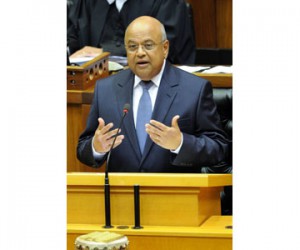South Africa faces high levels of unemployment and skills shortages at the same time, deploring the country's education system. "There is lots of room for the economy to do better," Finance minister Pravin Gordhan said. "But what will get us there is a political question."
Angel Gurría, secretary-general of the Organisation for Economic Co-operation and Development (OECD) – in delivering the Economic Survey of South Africa 2013 to Gordhan in March – stated that "the country also faced the big paradox of high levels of unemployment and skills shortages at the same time, deploring South Africa's education system. All successful countries had one thing in common: they invested in education."
Gordhan said the government was aware of the importance of education. "This government has placed education as its apex priority," he said. "Having improved access, we now have to work on improving quality."
Gurría slated South Africa for its lack of green initiatives and its inability to bring down its high level of carbon emissions.
"This is the one place where you may look like a developed country, but you don't want to," said Gurría. He said that while such economic activities as mining were energy-intensive, South Africa's electricity prices were among the lowest in the world.
He said electricity prices needed to be increased to cover the costs of reducing coal subsidies.
While Gordhan highlighted that reducing carbon emissions was taken seriously in the 2013 national budget, he also mentioned the temptation South Africa faces when it comes to fossil fuel consumption.
Gurría praised the state of South Africa's public finances as better than many OECD countries. The survey criticised South Africa's growth in state spending over the years which came mainly in the form of increases in public sector wages. The ratio of public debt to gross domestic product was expected to rise to above 40% in 2015/16.
He added that South Africa's economic growth was not where it could be. "Growth has been sluggish compared to other middle-income countries."
The South African product market, he said, was too uncompetitive, creating high barriers for new small businesses.
"The South African public don't quite understand what it means to have inadequate competition in the product market. Even our journalists don't write about it adequately," Gurría said.
The survey recommended expanding the scope of the Competition Commission and eroding the dominance of parastatals in the economy.
"It will be important to foster greater competition in network industries via reduced barriers to entry and an unbundling of the functions of the state-owned energy utility, Eskom, and the transport conglomerate, Transnet," stated the survey.
High unemployment was blamed partly on the "dualised" labour market that kept outsiders out. The collective bargaining system meant that workers in formal employment were protected while for the unemployed, the prospects of a job in the formal sector moved further away. Gurría said that many countries shifted from collective bargaining that covered an entire economic sector, to bargaining that was conducted at company level.
Gordhan added it was important to "open ourselves to external comparison and hear others' views about our economy."






